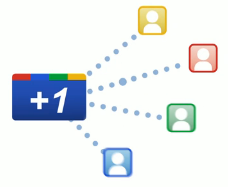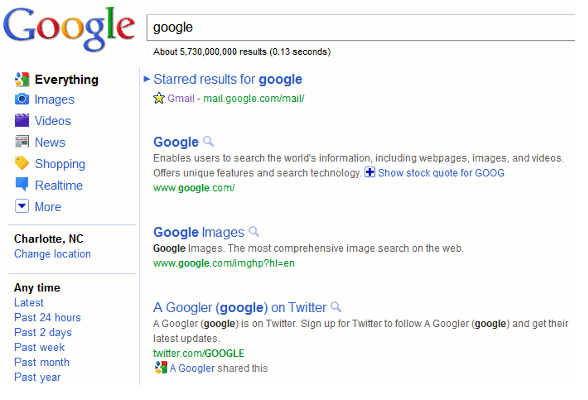Author Archive
Wednesday, June 29th, 2011
On Tuesday June 28, 2011 Google announced that they are very close to launching their new social network called Google +. Not to be confused with Google +1, the new Google + is a social network that is currently in a “field trial period” with a limited number of testers. Although there is no news available regarding the interaction between Google +1 and Google +, it seems logical that eventually the two Google services will somehow be used to complement one another. The goal of Google + is to bring more humanity or emotion to the world of online sharing and interaction.
The foundation of Google’s social network feels similar to other social networking sites like Facebook and Twitter. From the looks of it, Google + appears to incorporate the basics of social networking that we have grown comfortable with and even manages to offer a few unique and innovative features. Users can expect the following features to be included on the Google + Social Networking website following the trial testing period.

from http://www.google.com/intl/en/+/learnmore/, June 2011
+ Profile:
Creating a Google + Profile is similar to a Facebook profile. The profile enables users to fill in a bio, contact info, interests, upload photos, and link to other sites that they have created. This profile lets users remain in control by specifying who has access to their information and how much of their information is visible. The post tab located on the profile page also contains a record of all the posts made by the users. It’s important to mention that changing a Google + profile name will also change the name associated with your Google account and other Google services.
+ Circles:
Sharing on social networking should be more selective. In most cases the things you tell people depend on the type of relationship. It’s unlikely that you would share the same information with your friends and family as you would with co-workers or… Read the rest
Tags: Google, Google + circles, Google's social network, social network, social networking
Posted in Social Networking | 1 Comment »
Wednesday, June 22nd, 2011
It was only two months ago that Mozilla released Firefox4, one of the most successful browser releases that received over two hundred million downloads. Following the success of Firefox 4, Mozilla had announced and implemented a new production cycle to accommodate a rapid product release environment. The new production has enabled Mozilla to quickly develop and test new products which have led to them being able to offer a new version of Firefox only months later. As described in the Mozilla Blog, the new release is the first browser to support a Do Not Track privacy feature on multiple platforms.

from http://blog.mozilla.com/blog/2011/04/13/new-channels-for-firefox-rapid-releases/, June 2011
Mozilla first announced its new Rapid Release Development Cycle back in April. The previous production cycle contained three channels which included “Nightly Testing Builds”, “Firefox Beta”, and “Firefox Final Release”. The new development process introduced “ Aurora”. Aurora allows users to test new features and concepts that are more refined than those in the Nightly testing and less polished than the ones available in Beta testing. For a full description on the Mozilla constructing, testing, and release process visit the Mozilla Development Center. The new cycle has enabled Mozilla to test their feature and execute a faster product delivery for their customers. The two months it has taken Mozilla to develop Firefox5 are a drastic difference compared to the two years it took to deliver Firefox 4 to the public.
According to Mozilla “The latest version of Firefox includes more than 1,000 improvements and performance enhancements that make it easier to discover and use all of the innovative features in Firefox. This release adds support for modern Web technologies that make it easier for developers to build amazing Firefox Add-ons, Web applications and websites.”
Visually the new version and Firefox4 display no differences however the recent release now offers support for CSS animations, Do Not Track preferences, improved canvas and JavaScript support, better tuned HTTP idle… Read the rest
Tags: Beta Version, broswer release, browser, Firefox 4, Firefox 5, internet, Mozilla, Mozilla Firefox
Posted in Browser, Browser Modifications | No Comments »
Thursday, June 16th, 2011
Eliminating the barriers that stand between users and information is an endless goal for Google. The company continues to revolutionize the way users search the internet and strives to provide only the most relevant and superior content possible. On Tuesday June 14, 2011, Google held a media event in San Francisco to announce their new features that they hope will drastically change how users will search the internet. Among the features that were announced were Instant Pages, Search by Image, and Voice Search.

from http://www.google.com/insidesearch/voicesearch.html, June 2011
At the event Google also shared their latest search statistics. The stats showed that mobile search is following the same usage pattern as the early years of Google desktop search. Within the past couple years mobile searching has grown tremendously and with technology like voice recognition, mobile searching is expected to grow even more. Google believes that voice recognition is a technology that shouldn’t be limited to the mobile experience and that is why Voice Search is now available on a desktop. Their voice recognition is currently comprised of over 230 billion words or phrases and each day their system captures over 2 years’ worth of voice searches.
Voice search allows users to effortlessly speak what they are looking for and Google will find it, searching doesn’t get any easier than that. Voice search also helps out when users need to perform searches that are longer, more complex or harder to spell. Google Chrome 11 or higher and a microphone are required to use Google Voice Search. From there, voice searching is as easy as clicking on the small microphone button located by the search bar and speaking your search terms.
Another feature that first staked its ground on mobile devices was Google Goggles. Google Goggles allows users to search by snapping a picture with their mobile device. Google search now lets users search places, art, and animals using images on desktop computers.… Read the rest
Tags: Chrome, Google, Google Chrome, Mobile, search, Search Results, voice recognition, voice search
Posted in Browser Modifications, Search Engines | No Comments »
Wednesday, June 8th, 2011
Back in March Google began rolling out their +1 feature locally on their Google results page. The new feature enables users to activate the Plus 1 button when they wanted to recommend a website to other users. Since Facebook did not want to have their Like Button located on the Google search results page and chose to showcase it on Bing instead, Google has taken action and created its own way to boost social interaction. Similar to the Facebook Like Button, the plus 1 feature lets users put their stamp of approval on a website.

From http://www.google.com/+1/button/, June 2011
Exactly one week ago on June 1, 2011 Google announced that they are now offering the +1 button to website developers to place on their own content. On the day of the announcement the +1 buttons started appearing on major websites like Bestbuy.com, TheHuffingtonPost.com, and Nordstrom.com. After only a week the button now appears on large and small websites all across the Internet. Websites can display the button and enable people to recommend their website, blog or even individual products. Already the Google +1 feature seems to have a solid foundation but it continues to work towards being as widely used as its Facebook counterpart. From what we can tell here at Internet Beacon, the Google +1 button is being used frequently on the search results page but doesn’t quite yet have the exposure necessary to properly compete with the Facebook and Twitter sharing buttons that are on individual websites. In time this could change drastically, after all the button is only a week old.
It makes sense that Google would eventually assign some sort of values to this feature where the more plus ones a website has would equal a rank better, however it is still unclear how this development will affect SEO and the Google website ranking algorithm. Google could determine that sites who… Read the rest
Tags: +1, Google, Google Plus 1, search engine, Search Results, seo, social networking
Posted in Search Engine Optimization SEO, Search Engines, Social Networking | No Comments »
Wednesday, June 1st, 2011
Apple has recently announced that they will be unveiling the latest cloud storage service at the upcoming 2011 Worldwide Developers Conference on June 6 th. The WWDC is held annually in California at the Moscone Center which is the largest convention and exhibition complex in San Francisco. The convention takes place over 5 days and during this time Apple announces their latest software and technology for developers. The WWDC has taken place since 1983, each time with CEO Steve Jobs kicking off the convention with a keynote speech. Although Jobs has currently been on medical leave Apple has confirmed that he will still take part of this year’s convention kick-off.

from http://developer.apple.com/wwdc/about/, June 2011
This year, Apple plans to unveil their latest cloud storage service along with their next generation software – Lion, the eighth major release of Mac OS X and iOS 5, the next version of Apple’s advanced mobile operating system which is used by the iPad, iPhone and iPod touch.
The past couple of months have given way to much speculation regarding the Apple “iCloud” Storage. It is said that the service would work similar to Amazon Cloud Drive and Google Music Beta. However, since Apple’s service would possess licensing agreements they will be able to offer extra features that will provide them with a competitive advantage. One of the features is said to be a scan and match action that scans the user’s hard drive for music files and automatically matches it to a music file already on their service, thus eliminating the time it takes for user’s to upload their music. The iCloud music service will also offer users the option to store and access their music from any location or device with an internet connection.
Apple has reportedly already signed cloud-music licensing agreements with EMI Music, Warner-Music Group, Sony Music Entertainment, and is currently finalizing a deal with Universal Music… Read the rest
Tags: Apple, Apple iCloud, cloud, cloud service, cloud storage, iCloud, music, storage, worldwide developers conference, wwdc
Posted in Mobile Web, Technology, Web Development | No Comments »
Wednesday, May 25th, 2011
Like most Internet based companies, Facebook continues to take steps to ensure the safety of its users. Even with all the effort made by Facebook, no amount of Facebook security protocols will eliminate every scam and every hacker. Vulnerabilities will still persist regardless which is why the best protection seems to depend on user awareness. The majority of problem reports can most likely be avoided through proper user education. If users remain unaware of the current scams it leaves them unsuspecting and prime targets for malicious scams. Educating users to be aware the attacks while participating on social networking platforms could drastically help preserve the network integrity.

From http://www.Facebook.com, May 2011
The following are the top 4 Facebook scams that continue to plague user experience. These examples show that although Facebook is proactively implementing security precautions, flaws in their security remain. Once problems are identified Facebook should place a greater effort on expressing their concerns and warnings to the users rather than letting their users discover the problem first hand. Even though many users may have heard of these scams it was probably not directly from Facebook but instead from other websites blogs or from other users. For those of you that are hearing about them for the first time due to Facebook’s inability to properly educate the following 4 are the most prominent scams on Facebook today.
Click Hijacking:
For some, these messages may immediately appear to be scams but sometimes the offer is too enticing to refuse. Clickjacking calls for a user to copy and paste text into their browser search bar which infects the computer with malicious code. After a user unintentionally infects their computer the Clickjacker can use that account to distribute spam. Instead of Facebook identifying these types of messages and sending out a notice to users they leave it to the user to find out about it first-hand.
One example of Clickjacking is when a user receives a post from their friend… Read the rest
Tags: Facebook, fraud, malicious content, scam, social network, spam, spam content, Users
Posted in Facebook, Social Media Marketing, Social Networking | No Comments »
Friday, May 20th, 2011
It is common for competing companies to bash one another to gain the competitive edge that they need, however in the most recent case Facebook’s attempt was a huge failure that only hurt their own credibility. Using Twitter, a well known Google critic posted that a public relations firm had requested to add his name on an anti-Google article that they had ghost written. Following this post USA Today also confirmed that they had received a similar request.

Public relations firm Burson-Marstellar who has been representing corporate clients for 58 years was hired to encourage various media outlets to examine Google’s privacy practices. It was unbeknownst that Facebook was the one behind the secret smear campaign with many users initially thinking that it was Microsoft or Apple who was responsible. Once the secret campaign went public it was discovered that Facebook had been the one pulling the strings. This discovery was not only damaging to Facebook but to the integrity of the PR firm Burson-Marstellar as well.
Why did Facebook resort to this desperate attempt to smear Google’s name? It basically comes down to money and although Facebook would seem to be at the top of their game, Google is following closely. Before going awry, Facebook was trying to gain a larger lead against Google. The failed attempt has left both Facebook and BM frantic and eager to regain their ground. Some individuals may expect these kinds of dirty tactics as a regular part of business competition but for a company that emphasizes trusts and privacy like Facebook this backfire is greatly damaging to their reputation. Whisper campaigns like this take place all the time in business and political cases but most the time they do not end with the desperate company becoming the headline. This occurrence has left both Facebook and the PR firm Burson-Marstellar with diminished trust amongst their industries and customers.
Facebook maintains that it was not their intention to smear the competition… Read the rest
Tags: burson-marstellar, Facebook, Google, media, privacy policy, public, smear campaign
Posted in Facebook, Social Media Marketing, Social Networking | No Comments »
Friday, May 13th, 2011
Recently Google has begun testing a new search engine results page (SERP) with a limited group of Google users. It is unknown what criteria Google used to determine which users were given this opportunity and because there is no opt in for testing most users can only experience the new page via screenshots.
It remains unclear whether or not Google will further expand this sample testing or even continue in the same direction once they acquire usability feedback. Due to the limited testing being fairly recent no real results have been released other than the initial feedback from users that the new page is ugly or that it looks better, which really depends only on the users taste and not the designs usefulness.

From Google, May 2011
For the users that were not selected to participate in the new  search results page trial you can view the changes at Google’s New Search Interface. As you can see from the screen capture it seems that Google has eliminated or scaled down the amount of information provided for each search result. The text has also decreased in size and appears cleaner with more white space. The older results page features a darker blue, green, and purple text color whereas the new page showcases brighter but muted pastel colors. The new colors go a long way to make the page look prettier but don’t offer the same contrast as the old page and instead can make it harder for some users to view because the bright on white color scheme. In addition there is also less page identification because the page title is no longer underlined. search results page trial you can view the changes at Google’s New Search Interface. As you can see from the screen capture it seems that Google has eliminated or scaled down the amount of information provided for each search result. The text has also decreased in size and appears cleaner with more white space. The older results page features a darker blue, green, and purple text color whereas the new page showcases brighter but muted pastel colors. The new colors go a long way to make the page look prettier but don’t offer the same contrast as the old page and instead can make it harder for some users to view because the bright on white color scheme. In addition there is also less page identification because the page title is no longer underlined.
Whenever there is a change with Google we have to ask how will this impact Search Engine Optimization? The main concern with this trial SERP is with the increase in white space between search results. Although the page certainly looks cleaner, the insertion of more space creates… Read the rest
Tags: Google, Internet Marketing, results, search engine, Search Results, SERP, Testing, user
Posted in Search Engine Optimization SEO, Search Engines | 2 Comments »
Friday, May 6th, 2011
April was a big month for Facebook, among some of the changes that they implemented were new security tools, Facebook Deals, and the Facebook Send button. Each of the new features was designed to provide users with a safe and beneficial user experience.

The first of the three features that Facebook released was a New Suite of Safety Tools. The new security provides users with additional information for user and family safety. In addition to the existing safety content the new resources include articles and videos on Facebook security and privacy. Along with the new safety content users will now be able to use social reporting tools to express to the community what items they do not like or find offensive. Another part of the new security features is two factor authentications. Two factor authentications are used to further prevent unauthorized users from accessing other user accounts. This protection procedure requires a secondary code when logging in from an unrecognized device or location. The last announced security update for Facebook is the option for users to access Facebook using a secure connection over HTTPS. However, because some apps do not accommodate HTTPS Facebook will need to automatically switch between HTTP and HTTPS given the user’s authorization.
Following the implementation of their new security, Facebook also launched Deals on Facebook. Deals on Facebook is currently being tested and is only offered in certain areas like Atlanta, Dallas, Austin, San Diego, San Francisco (many more to follow shortly). This feature lets Facebook users locate deals from local businesses, share, and coordinate plans with other Facebook users. Deals on Facebook will work similar to Groupon and Living Social but are now built right into the social network, which is convenient for both customers and businesses who utilize Facebook.
The latest addition made to Facebook is the “Send” button. This new button is very similar to the “like” button which was introduced last year. The… Read the rest
Tags: Facebook, facebook deals, internet, like button, send button, social networking, Users
Posted in Facebook, Social Media Marketing, Social Networking | No Comments »
Thursday, April 28th, 2011
Does code validation really matter and if so to whom does it matter to, a website visitor, a search engine, both? Not everyone thinks that code validations are all that important and feel that search engines do not consider validation when ranking a website. Regardless of the impact that code validation has on a websites ranking, both sides of this discussion can agree that code validation is useful for a number of other reasons.

http://validator.w3.org/
Code validation is the process of inspecting and amending the code or your web documents. This is done by comparing the code to formal standards like those established by the World Wide Web Consortium (W3C). The W3C is the main international standards organization for the Internet. This organization offers a markup validation service to check HTML documents for errors and ensures that they are in accordance with their standards. To fully validate a websites code two separate assessments need to be performed, one for the HTML or XHTML and another for the Cascading Style Sheets (CSS). Although a number of programs like XHTML-CSS offer code validation services that are based on the standards set forth by the W3C it might be best to use the actual html validator and css validator provided by the World Wide Web Consortium.
Getting back to why it is important to validate your code regardless of how it impacts the page rank, of the many reasons for validation there are 6 fundamental reasons why it should be done.
Debugging and Maintenance:
HTML and CSS validation works similarly to a spell checker by locating errors found throughout your web documents. During the validation process errors are identified and documented so that a user can easily fix them.
Learning and Prevention:
As the validation process identifies common errors you can learn from your mistake and therefore prevent the… Read the rest
Tags: browser, code, errors, html validation, search engines, standards, validation, W3C, World Wide Web Consortium
Posted in Search Engine Optimization SEO, Web Development, Web Tips | No Comments »
|